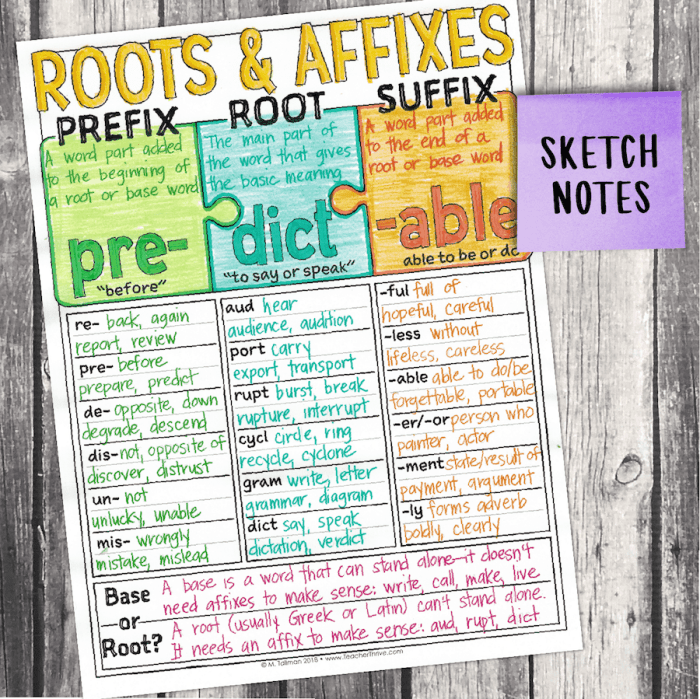Words that have the root ped form the foundation of this captivating journey into the world of language, where we uncover the origins, scientific significance, literary brilliance, and educational impact of this enigmatic root.
From its humble beginnings, ped has evolved into a versatile linguistic tool, shaping our understanding of the natural world, enriching our cultural tapestry, and guiding our educational endeavors.
Etymology of “Ped”
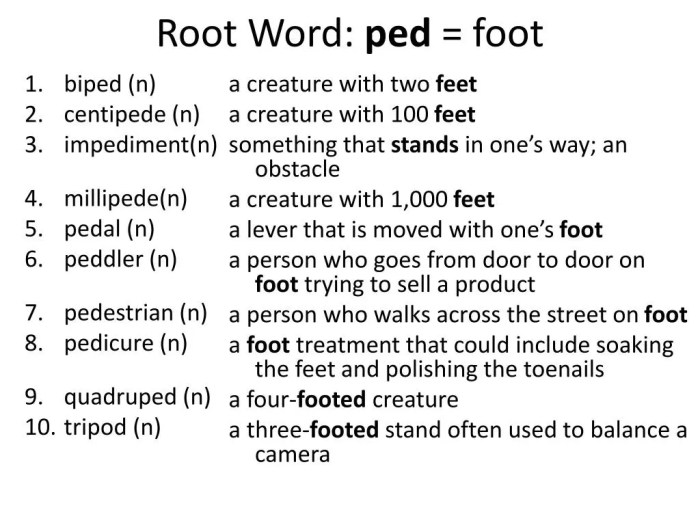
The root word “ped” originates from the Latin word “pes,” which means “foot.” It has been widely adopted in various languages, including English, to form words related to feet and movement.”Ped” has evolved linguistically over time, acquiring new meanings and connotations.
In English, words derived from “ped” often convey the sense of walking or movement, such as “pedestrian” (a person walking), “pedicure” (a foot treatment), and “pedal” (a lever operated by foot).The root word “ped” plays a significant role in the formation of new words.
Words that have the root ped often refer to feet, such as “pedal” and “pedestrian.” Similarly, many words that start with hosp relate to hospitals, like hospice and “hospital.” However, words with the root ped extend beyond feet, encompassing broader concepts like “impediment” and “pedagogy.”
It allows for the creation of specialized terms that describe specific aspects of feet and movement. This versatility has contributed to the expansion of vocabulary and the precise expression of ideas related to these concepts.
Examples of Words Derived from “Ped”
- Pedal: A lever operated by foot, used to control a mechanism or vehicle.
- Pedestrian: A person walking, especially in a street or public place.
- Pedicure: A cosmetic treatment for the feet, involving nail care, exfoliation, and massage.
- Pedalboard: A device used by musicians to mount and organize multiple pedals for electric guitars or other instruments.
- Pedaling: The act of using pedals, especially in cycling or playing musical instruments.
Ped in Scientific Terminology
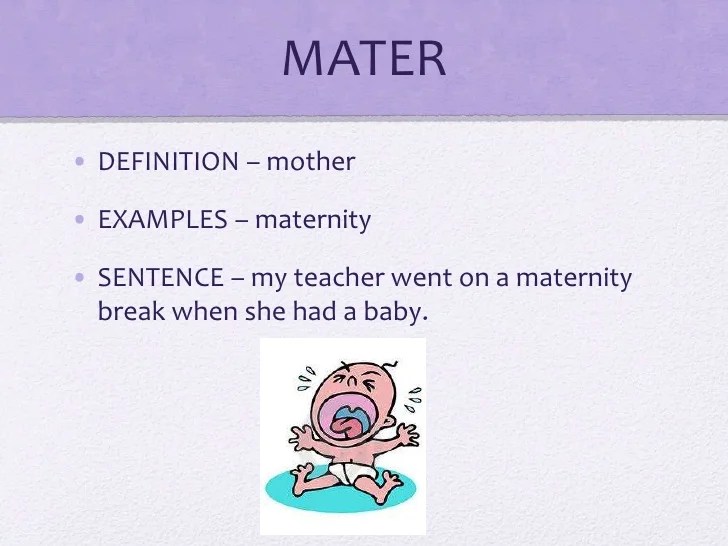
The root “ped” finds extensive application in scientific disciplines, particularly in biology and geology, to denote concepts related to the foot or base. Its usage enables precise classification and description of scientific concepts.
Biology
- Pedicel:A slender stalk supporting a flower or fruit.
- Pedipalps:Appendages near the mouth of arachnids, used for feeding and sensory functions.
- Peduncle:A stalk supporting a flower or cluster of flowers.
Geology, Words that have the root ped
- Pedology:The study of soils, their formation, and classification.
- Pediment:A gently sloping erosion surface at the base of a mountain or hill.
- Pedestal:A natural rock formation with a narrow base supporting a larger upper section.
Ped in Literary and Cultural Contexts
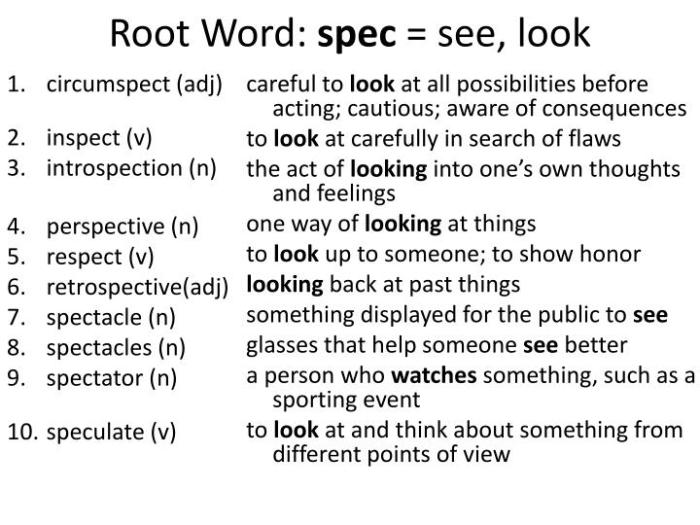
The root “ped” finds its way into various literary and cultural expressions, contributing to the richness and depth of language. In literature, words derived from “ped” often serve as literary devices, enhancing the impact and meaning of written works.
Literary Devices and Figures of Speech
- Pedantry:Excessive display of knowledge or attention to trivial details, often used for comedic effect.
- Pedigree:A person’s ancestry or lineage, used to convey social status or distinction.
- Pedestal:A raised platform, often used metaphorically to represent a position of honor or reverence.
Cultural Significance and Impact
Words derived from “ped” have a profound cultural impact, shaping societal values and beliefs. For instance, “pedestrian” evokes images of everyday life and the common man, while “pediatrician” represents the importance of child health and well-being.
Pedagogy and Education: Words That Have The Root Ped
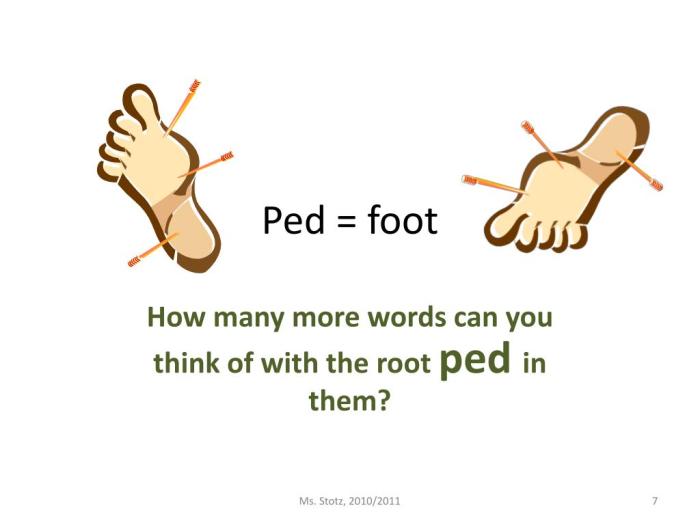
The root “ped” is deeply intertwined with the field of education. It stems from the Greek word “paidos,” meaning “child,” and signifies a connection to the teaching and upbringing of children. This etymological link underscores the fundamental role of “ped” in shaping educational practices and theories.
- Pedagogy:The art and science of teaching, encompassing the principles, methods, and techniques used to facilitate learning.
- Pedagogical:Relating to or concerned with pedagogy, emphasizing the practical application of teaching methods.
- Pedagogy of Oppression:A critical theory that examines how power structures and social inequalities are perpetuated through educational systems.
- Pedagogy of Liberation:An educational approach that aims to empower learners, fostering critical thinking and social justice.
- Andragogy:The art and science of teaching adults, recognizing their unique learning needs and experiences.
- Heutagogy:A self-directed learning approach where learners take ownership of their learning journey.
The presence of “ped” in these terms highlights the enduring influence of the child-centered perspective in education. It underscores the significance of understanding the developmental needs of learners and tailoring teaching practices accordingly. Moreover, the extension of “ped” beyond the traditional realm of child education into adult and self-directed learning reflects the evolving nature of education in a rapidly changing world.
FAQ Corner
What is the origin of the root word “ped”?
The root word “ped” originates from the Latin word “pes,” meaning “foot.”
How is “ped” used in scientific disciplines?
“Ped” is commonly used in scientific disciplines such as biology and geology to refer to concepts related to the foot or base, such as “pedicel” in botany and “pedosphere” in geology.
Can you provide an example of a literary device that employs “ped”?
One example is the literary device “pedantry,” which refers to excessive or unnecessary display of knowledge or learning.
